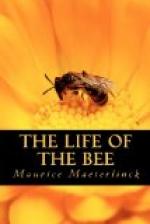[4]
Let us now, having learned from books all that they had to teach us of a very ancient history, leave the science others have acquired and look at the bees with our own eyes. An hour spent in the midst of the apiary will be less instructive, perhaps; but the things we shall see will be infinitely more stimulating and more actual.
I have not yet forgotten the first apiary I saw, where I learned to love the bees. It was many years ago, in a large village of Dutch Flanders, the sweet and pleasant country whose love for brilliant colour rivals that of Zealand even, the concave mirror of Holland; a country that gladly spreads out before us, as so many pretty, thoughtful toys, her illuminated gables, and waggons, and towers; her cupboards and clocks that gleam at the end of the passage; her little trees marshalled in line along quays and canal-banks, waiting, one almost might think, for some quiet, beneficent ceremony; her boats and her barges with sculptured poops, her flower-like doors and windows, immaculate dams, and elaborate, many-coloured drawbridges; and her little varnished houses, bright as new pottery, from which bell-shaped dames come forth, all a-glitter with silver and gold, to milk the cows in the white-hedged fields, or spread the linen on flowery lawns, cut into patterns of oval and lozenge, and most astoundingly green.
To this spot, where life would seem more restricted than elsewhere—if it be possible for life indeed to become restricted—a sort of aged philosopher had retired; an old man somewhat akin to Virgil’s—
“Man equal to kings, and approaching the gods;”
whereto Lafontaine might have added,—
“And, like the gods, content and at rest.”
Here had he built his refuge, being a little weary; not disgusted, for the large aversions are unknown to the sage; but a little weary of interrogating men, whose answers to the only interesting questions one can put concerning nature and her veritable laws are far less simple than those that are given by animals and plants. His happiness, like the Scythian philosopher’s, lay all in the beauties of his garden; and best-loved and visited most often, was the apiary, composed of twelve domes of straw, some of which he had painted a bright pink, and some a clear yellow, but most of all a tender blue; having noticed, long before Sir John Lubbock’s demonstrations, the bees’ fondness for this colour.




